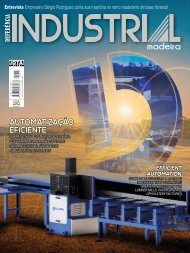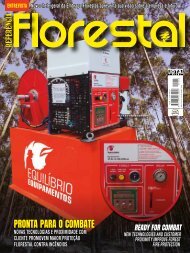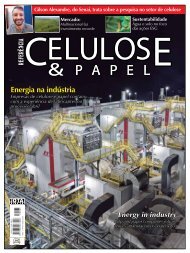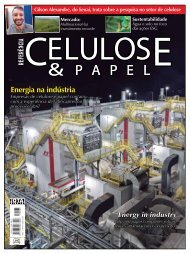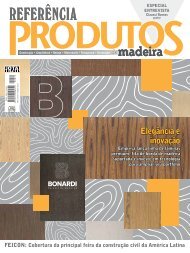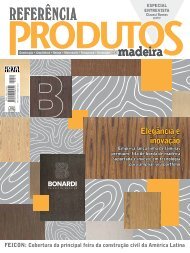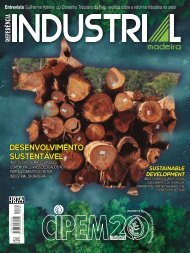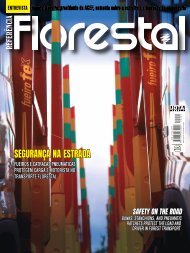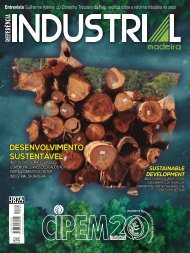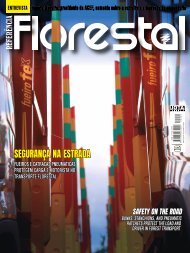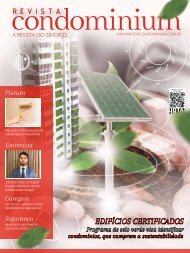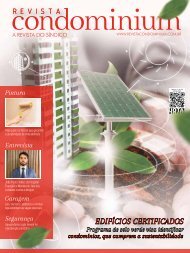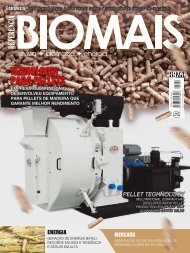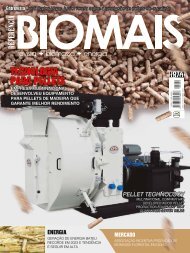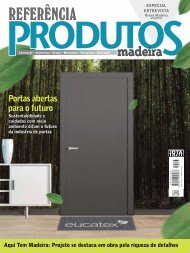Create successful ePaper yourself
Turn your PDF publications into a flip-book with our unique Google optimized e-Paper software.
ENTREVISTA<br />
como tolerância a estresses diante de secas, pragas,<br />
são experimentos longos. Recentemente temos atuado<br />
também uma outra tecnologia de produção genótipa,<br />
que gera materiais com características específicas, não<br />
necessariamente transgênico, que está sendo avaliado<br />
pelo CIBio (Comissão Técnica Nacional de Biossegurança).<br />
Submetemos um material de cana-de-açúcar editado,<br />
que foi considerado não transgênico. Tem característica<br />
que diminui tempo de desenvolvimento, diminui custos.<br />
Por outro lado também temos trabalhado em sistemas<br />
de produção em campo com novas espécies como a<br />
canola, produzida em volume substancial no sul, mas<br />
fazendo um processo de tropicalização, trazendo a canola<br />
para a região centro-oeste, movimento análogo que foi<br />
feito com a soja em outros momentos, sendo a canola<br />
alternativa para produção de óleo. Esse é um trabalho de<br />
tropicalização, melhoramento do sistemas de produção.<br />
Temos feito um trabalho também com a macaúba, uma<br />
espécie perene com cadeia extrativista bem estabelecida,<br />
mas não tão produtiva, com foco no desenvolvimento da<br />
matéria-prima e o foco é a integração com agrofloresta,<br />
modelos sustentáveis em modelos agrícolas e inclusão<br />
social produtiva. É uma ação que estamos desenvolvendo<br />
no nordeste. E a quarta vertente de biomassa seria a<br />
questão de utilização de biomassas residuais agrícolas<br />
dentro de modelos circulares para produção de biocombustíveis,<br />
identificando características de biomassas<br />
residuais e desenvolvendo aplicações.<br />
Como a Embrapa Agroenergia pode contribuir<br />
com a transição energética?<br />
Essa é uma agenda importante. Estamos muito inseridos<br />
justamente por possibilitar a expansão na produção<br />
de fontes de energias renováveis e biorenováveis e sua<br />
utilização. Uma outra agenda importante é a de descarbonização,<br />
de biocombustíveis, bioinsumos, bioprodutos<br />
em geral que contribuem para descarbonização nas<br />
indústrias por terem uma pegada de carbono menor que<br />
outras. A agenda de circularidade é importante para entender<br />
que tudo é passível de uso dentro de um modelo<br />
adequado. Reciclar, reaproveitar, reutilizar é uma agenda<br />
que temos nos identificado e uma agenda de intensificação<br />
sustentável da agricultura, que é possibilitar que<br />
se utilize produtos de origem agrícola para obtenção de<br />
novos bioprodutos, novos biocombustíveis novos mercados,<br />
como o de carbono. A gente intensifica de maneira<br />
inteligente o próprio sistema agrícola na mesma área,<br />
com a mesma quantidade de biomassa, na mesma unidade<br />
de tempo está produzindo novos produtos e gerando<br />
is being evaluated by the National Technical Commission<br />
on Biosafety (CIBio). We have submitted an edited sugarcane<br />
material found to be non-transgenic. It has a feature<br />
that reduces development time and costs. On the other<br />
hand, we have also been working on field production<br />
systems with new species, such as that of canola, produced<br />
in substantial volume in the South, but carrying out<br />
a tropicalization process, bringing canola to the Midwest<br />
Region, an analogous movement that was done with<br />
soybeans at other times, with canola being an alternative<br />
for vegetable oil production. This is a work of tropicalization<br />
and improvement of production systems. We have<br />
also been working with macaúba, a perennial species,<br />
today with a well-established extractive chain, but not as<br />
productive, with a focus on the development of the raw<br />
material and the focus on integration with agroforestry,<br />
sustainable models in agricultural models, and effective<br />
social inclusion. It is an action that we are developing in<br />
the Northeast. The fourth study involving biomass would<br />
be the issue of using agricultural biomass wastes within<br />
circular models to produce biofuels, identifying biomass<br />
waste characteristics, and developing applications.<br />
How can Embrapa Agroenergia contribute to the<br />
energy transition?<br />
This is an important agenda. We are very much involved<br />
in this precisely because we enable the expansion in<br />
the production of renewable and biorenewable energy<br />
sources and their use. Another important agenda is that<br />
of decarbonization, biofuels, bioinputs, and bioproducts,<br />
in general, contributing to decarbonization in companies<br />
so they have a lower carbon footprint than others. The<br />
circularity agenda is critical to understand that everything<br />
can be used within an appropriate model. Recycling,<br />
making use of, and reusing is an agenda that we have<br />
identified ourselves with and an agenda for the sustainable<br />
intensification of agriculture, which is to make it<br />
possible to use products of agricultural origin to obtain<br />
new bioproducts, new biofuels, and new markets, such as<br />
the carbon market. We intelligently intensify our own agricultural<br />
system in the same area, with the same amount<br />
of biomass, in the same unit of time you are producing<br />
new products and generating new sources of income. The<br />
energy transition, circular economy, sustainable intensification,<br />
and decarbonization agendas are important<br />
agendas that are related to the agenda that is emerging<br />
in the Country of developing a new Industrial Sector that<br />
is renewable, that is green, and that is circular and decarbonizing.<br />
The study of biomass from agricultural sources<br />
36 www.REVISTABIOMAIS.com.br



